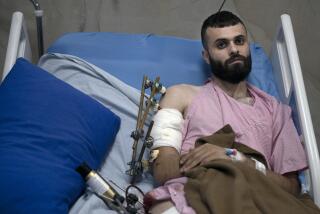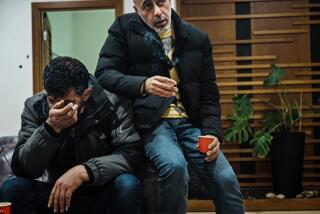Palestinians’ Target Was an Israeli -- but Also an Arab
- Share via
JERUSALEM — In a conflict zone where the sides seem starkly etched in black and white, George Elias Khoury inhabited the gray region in between.
The 19-year-old Israeli university student was also an Arab and a Christian. His father, a respected Jerusalem lawyer, defended the rights of Palestinians in the West Bank but also had admirers in Israel proper. The younger Khoury spoke Arabic, Hebrew and English and was involved in projects such as a student United Nations that sought to bridge differences between people.
All that mattered little Friday night when Palestinian gunmen in a car opened fire in a Jewish neighborhood where Khoury was jogging, mistaking him for a Jew. Khoury was struck four times, family members said, and died soon after. Despite a manhunt by Israeli police, no one was arrested.
The extremist Al Aqsa Martyrs Brigade quickly claimed responsibility for the nighttime attack. It said fighters had shot at “Zionists” in a neighborhood known as French Hill, which was annexed by Israel after the 1967 Middle East War.
Their victim instead turned out to be a fellow Arab -- one who sympathized with the plight of Palestinians but frowned on the use of violence to work out their differences with Israel.
“He didn’t know to distinguish. He felt that every place belonged to everyone and that all of us are equal,” said his father, Elias, during an interview Saturday at the family’s home in an Arab section not far from the shooting site.
For the elder Khoury, the slaying carried a special horror because of its familiarity: His father was killed 29 years ago in a bombing in downtown Jerusalem by Palestinian militants who planted explosives on a busy street. The man held responsible, Ahmed Jabara, was freed from an Israeli prison last summer along with about 100 other Palestinian prisoners in a deal worked out by the Israeli and Palestinian governments.
On Saturday, between greeting fellow mourners and fielding condolence calls in Arabic and Hebrew, Elias Khoury blamed both sides for violence that has raged off and on for decades, but has been especially intense during the 42-month Palestinian uprising.
Attacks by Palestinians are “a terror which is no less barbaric than the [Israeli] occupation itself. Both sides are just wasting lives of innocent people for nothing,” he said. “They are destroying both societies.”
Family members said the younger Khoury would have agreed.
George Khoury was studying economics and international relations at Hebrew University and looked forward to studying overseas and becoming a lawyer like his father. He had gone on two foreign trips to attend student conferences; a stack of family photographs included a picture of him in China.
An accomplished pianist, Khoury was a fitness buff who ran three times a week at the track in French Hill. He was jogging alone when he was shot Friday night, said Rayek Khoury, a second cousin and close friend.
George Khoury was keenly aware of his place along the seams in a land where identity and religion often divide with razor-wire precision.
There are about 1 million Israeli Arabs, who, unlike Palestinians living in the West Bank and Gaza Strip, are citizens of the Jewish state. In the past, other Arabs also have been killed during suicide bombings of buses and restaurants, and in cases of mistaken identity.
Rayek Khoury said his cousin used to talk of his “multiple identities.” George Khoury perfected his English while an honors student at an Anglican school in Jerusalem and counted among his friends Arabs and Jews.
“His attitude was there’s no difference who is being killed -- the Palestinian or the Israeli,” said Rayek Khoury, who has played in an orchestra made up of Israelis and Arabs from various Middle Eastern countries. “It’s the same pain to hear about Palestinians killed in Gaza or Jenin as well as innocent people getting killed in Jerusalem or Ashdod.”
On March 14, 10 Israelis were killed in a double suicide bombing at the Ashdod seaport, prompting Israeli officials to announce a stepped-up offensive against Palestinian militants in the Gaza Strip. At least eight Palestinians have been killed in fighting there since then.
The back-and-forth violence has escalated in the weeks since Prime Minister Ariel Sharon proposed withdrawing from most or all of the 21 Jewish settlements in the Gaza Strip as a way to relieve the Israeli army of having to defend them.
Israel Radio reported Saturday that a 7-year-old Palestinian girl died of gunshot wounds suffered as she played outside her home in a Gaza Strip refugee camp a day earlier. Witnesses said the shots were fired from an Israeli outpost, but military officials denied that their soldiers were responsible.
Meanwhile, as the Khoury family made funeral preparations, the Al Aqsa Martyrs Brigade issued a statement Saturday afternoon apologizing for the slaying. Palestinian Authority President Yasser Arafat called the Khoury family to denounce the killing and promised an investigation into who carried it out.
But there was little solace for the victim’s relatives, who were struggling with grief and fury but mostly looked numb.
Rayek Khoury wept softly as he thumbed through photographs of his cousin. He wondered who would be his confidant now, and said there would perhaps be relief in seeing the killers caught and punished.
“Justice was not done here,” he said. “He was killed cruelly, by people who thought he was a Jew.”
More to Read
Sign up for Essential California
The most important California stories and recommendations in your inbox every morning.
You may occasionally receive promotional content from the Los Angeles Times.













